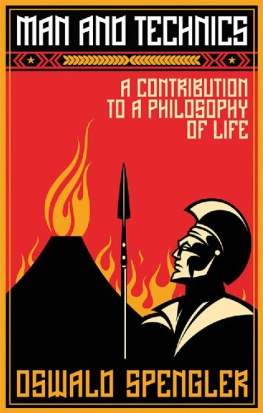Man and Technics
A Contribution to a Philosophy of Life
Oswald Spengler
Man AND Technics
A Contribution to a Philosophy of Life
Arktos
2015
Copyright to the second English edition 2015 by Arktos Media Ltd.
All rights reserved. No part of this book may be reproduced or utilised in any form or by any means (whether electronic or mechanical), including photocopying, recording or by any information storage and retrieval system, without permission in writing from the publisher.
Printed in the United Kingdom.
ISBN 978-1-910524-17-6
BIC-classification
General and world history (HBG)
Social and political philosophy (HPS)
Translation
Charles Francis Atkinson and Michael Putman
Original title: Der Mensch und die Technik (Munich: C. H. Beck, 1931)
EDITING
Michael Putman and John B Morgan
Cover design
Andreas Nilsson
Layout
Tor Westman
ARKTOS MEDIA LTD.
www.arktos.com
Contents
EDITORS NOTE
This edition is based on the translation of Man and Technics that was done by Charles Francis Atkinson and published by Allen and Unwin in London and Alfred A Knopf in New York in 1932. However, Michael Putman has completely revised the translation, correcting some errors, improving the language, retranslating some passages, and putting back some words and phrases that were omitted from the original. It is our belief that the present edition comes closer to the original German.
Most of the footnotes were present in the original edition. Footnotes that have been added by me, with the assistance of Michael Putman, are so indicated.
JOHN B MORGAN
Budapest, Hungary
20 January 2015
Preface
by Lars Holger Holm
The question of how to either play an active role in a Western tragedy entering its final act, or to lamentably perish as a passive victim of the universal mechanisation that is to be its general theme, is at the heart of the present volume by Oswald Spengler entitled Man and Technics , originally published in 1931. Although its message can by no means be regarded as a mere symptom of the zeitgeist, it is today, with historical hindsight, almost impossible not to read it against the background of a liberal Weimar Republic in tatters, of a crippled nation at the mercy of hordes of Bolsheviks and Nazis engaged in a life-or-death struggle; in short: of a German Reich descending into the vortex of financial, cultural and spiritual disaster.
The early 1930s saw the consolidation of totalitarian regimes in many European countries, not just Germany. Liberal democracy had all but succumbed. In France, which was seemingly inoculated against fascism by a series of socialist revolutions, the dark shadow of political terror was looming on the horizon. Even the birthplace of the European parliament, England, was made politically uneasy by the marching boots of Germany, Italy, and the Soviet Union. In Russia there was Stalin. For that matter, some of the measures in Roosevelts New Deal were also totalitarian, for example his Executive Order 1062 which instigated the confiscation, at an artificially low fixed rate, of all privately-held gold in the United States. For more than a decade there had in addition been a ban on alcohol throughout the entire country.
Artistically speaking the times, particularly in Germany, were saturated with a darkly-coloured Expressionism dominating art, photography, film, literature, and music. Although Spengler always insisted on regarding art in the era of civilisation in Spenglers particular vocabulary this term signified the inescapable end of any superior culture allowed to run its natural course as a contradiction in terms, his own combination of succinct cultural analysis with dreamlike, visionary, even mystical, ideas unmistakably bears the hallmark of an Expressionism characteristic of such diverse creations as the Metropolis of Fritz Lang, the sordid darkness of Franz Kafkas The Castle , the erotic angst of Alban Bergs opera Lulu , and the pent-up fury in a stormy seascape by Emil Nolde. Dark indeed was the zeitgeist, the belief in Western civilisation as such having been shattered in its fundaments. In artistically sensitive people such as Oswald Spengler, the nightmarish aspect of contemporary civilisation was about to become a reality, as horrifying as it was irrefutable.
The tragedy Spengler prophetically anticipates is thus the same as the one outlined in his primary work, The Decline of the West , only the tones and shades now used to fill in the contours have deepened. At stake is the accumulated historical consequence of the Will to Power inherent in the demonic Nordic-Faustian mentality since the early days of the Viking explorations, the Christian Crusades, and the construction of immense cathedrals in medieval times. The last metamorphosis of this long historical process is the technology of the machine that prepares the worlds nations for a final battle for financial and political world hegemony, whereby the Faustian spirit will in the end annihilate itself and turn into yet another historical fossil. But it was Spenglers firm belief that the Europe and America of his day had so far only begun to mobilise for the final battle, and that anyone who wanted to give the gods a helping hand on the day of Ragnarok should hasten to prepare himself for what must necessarily come to pass.
In 1936 Oswald Spengler, the philosopher of Occidental doom, passed away during the dress rehearsal for the Second World War known as the Spanish Civil War, which was essentially a Nazi-Bolshevik proxy war. Spengler had never liked Hitler and Hitler never liked him. But although it is certain that he would never have endorsed Hitlers eugenics and anti-Semitism, the subsequent World War nevertheless would have confirmed in him the conviction that the curtain to the fifth and concluding act of the European tragedy had indeed been raised. It is no coincidence that the concluding words of Man and Technics convey the image of a Roman soldier who dies while on duty, in front of a house in Pompeii on the day of its volcanic eruption, simply because his superiors had not relieved him of duty. Whereas The Decline of the West still spoke of cultural death in impersonal terms, the soldier dying on duty, in a gesture of vain but unflinching steadfastness, is an image of personal, tragic fatalism. Such acts of tragic heroism were known to the Vikings as well. A passage from the Hvaml (Song of Odin) in the Poetic Edda , from a time that Spengler would describe as the early spring of Faustian culture, comes to mind: Cattle die, friends die, and you yourself die. One thing I know of that never dies: the reputation of a dead man. In 1931 the only hope Spengler saw for Anglo-European civilisation was for its proponents to dutifully remain at the post where Destiny had placed them, regardless of the outcome of their efforts.
Though Spenglers cultural pessimism in general seems to have deepened during the years preceding Hitlers rise to power in 1933, he nonetheless retained his sensitivity to philosophical nuances and fine distinctions. Before arriving at his final definition of industrial technology and its ominous historical mission more than implying that, in its grip, we are all children of Sisyphus Spengler opens his argument by demonstrating that what we today call technology, with all its specialised and machine-based applications, is a development of something that is common to all living beings on the planet: technique . Technique is not a thing, nor even a procedure, but the way any individual, animal or human, asserts and adapts itself to a given situation. There is just as much specific technique involved when a human plays the violin as when a lion stalks, attacks, and finally rends its prey. However, Spengler is not suggesting that the lion could play the violin if he wanted, or that the violinist could take down a zebra with his bare hands. The essential difference is that whereas the technique of the violinist is something that an individual acquires, that of the lion belongs to the species of lions as a whole. But regardless of whether it is an attribute of an individual or something that pertains to the entire species, technique is not a thing, but a living activity. Understanding the evolution of different techniques is thus to understand the evolution of various forms of animal and human activities in their specific environments.







